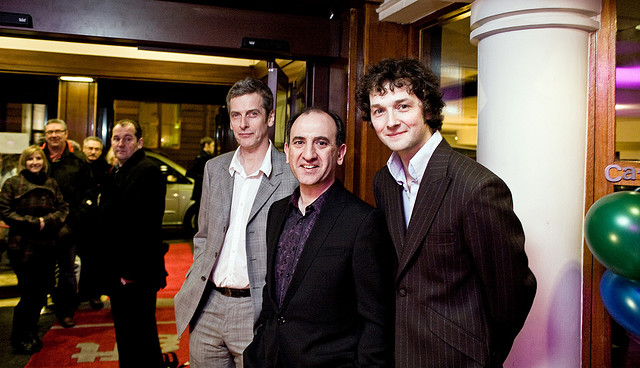Fact or fiction? Perceptions of politics from Trollope to House of Cards
How does political fiction impact on the viewers’ perceptions of real-word politics? The author of a new book on the subject, Steven Fielding, argues that democracy may not benefit from cynical programmes which pander to populist prejudices about the virtues or otherwise of our elected officials.
Cynical dramas about Westminster, like House of Cards, now enjoying a new life thanks to its US adaptation, have always been popular, either in the form of Michael Dobbs’ original 1989 novel or Andrew Davies’ 1990 BBC TV version. But are such fictions anything more than harmless diversions that leave untouched the real world of politics?
Cabinet minister Hazel Blears certainly thought so. In 2008 she argued that the unremittingly negative portrayal of politics found in House of Cards, but also the 1980s sitcom Yes, Minister and its contemporary equivalent, The Thick of It, undermined many people’s desire to be involved in politics. Blears was however out-of-step with other MPs as well as with professional students of politics, few of whom take fiction seriously as a factor in undermining trust in representative democracy.
There is nonetheless much evidence that fictions about politics play an important if insidious role in structuring how many people imagine Westminster. Politics has always been mediated – only a minority have ever personally participated in decision-making apart from voting in elections. Yet, as fewer vote, or watch the news or read newspapers, entertainment television and the cinema are increasingly the only source from which many now glean their impressions about politics.
While there is no direct British evidence so far, since the 1970s US social scientists have studied the impact of screen political dramas. The Candidate, a 1972 film about how an idealistic contender for the Senate was packaged by his media handlers for example encouraged audiences to think image and its manipulation more important in determining electoral success. Washington: Behind Closed Doors a 1977 TV series made viewers believe government dishonesty was a significantly more important problem than before. The vast majority of a JFK (1991) audience came out of Oliver Stone’s movie more firmly believing that the assassination of President Kennedy was perpetrated by a conspiracy. In contrast, after watching episodes of the TV series The West Wing – which gave an unusually sympathetic account of a fictional President – viewers became more positive about Presidents Clinton and Bush.
These studies and many others suggest that while individual dramas cannot overturn audience members’ fundamental beliefs, they can reinforce prior opinions, if these are in sympathy with the story, while increasing the salience of the narrative’s subject. So, someone already cynical about politics will be even more sceptical if they watch a drama that suggests politicians are only interested in power for corrupt reasons. In contrast, a person who firmly considers that MPs are generally trying to do the right thing will be unlikely to be affected. As an army of opinion surveys suggest, more Britons hold to the former rather than to the latter view.
Many contemporary political dramas also now habitually mix fact with fiction. The New Labour years saw a proliferation of fictionalised Tony Blairs, none of which highlighted his better qualities, presenting the Labour leader as a spin-obsessed, self-regarding liar. Students of such docu-dramas believe them to be uniquely persuasive. One of the first of these was Thatcher: The Final Days, ITV’s 1991 dramatised reconstruction of Margaret Thatcher’s enforced exit from Number 10 the year before. Geoffrey Howe, whose resignation from the Cabinet had precipitated Thatcher’s fall, recalled in his memoirs, watching the programme:
‘At almost every moment when my actions, my words, were being depicted, I was conscious of serious, no doubt unintentional inaccuracies. Literally nothing was quite right. Yet for all those sequences where I was not on screen, disbelief was largely suspended. The talking, moving picture is a compelling witness. … Beguilingly, the cameras appeared to be telling the truth, except where I positively knew them to be inventive and false.’
If this was Howe’s reaction, how much more likely is it that audiences will accept as true that part of a story beyond their experience?
Some might think that all such fictions do is to mirror the awful reality of contemporary Westminster. That is certainly what many writers claim. And, historically, fiction has been a means of critiquing democracy’s many and real shortcomings while also exploring important political ideas in a popular way. However cynically The Thick of It presented politics, it was inspired by Armando Iannucci’s real concern that the New Labour government was dominated by spin and belief that the public had been deliberately misled over the existence of Iraq’s Weapons of Mass Destruction.
In fact almost all dramas about politics now highlight the dark side of democracy, depicting a Westminster in which self-interest and conspiracies against the people prevail. Such populist tales have long been a feature of political fiction, but in the past were offset by dramas showing decent men attempting to undertake the difficult business of government, most notably the novels of the Labour MP Maurice Edelman, which were often adapted for the stage and TV. What contemporary dramas reflect is less the reality of Westminster as the public’s own prejudices about the institution and its members.
There are more positive depictions of politics, fictions that at least do not assume that all politicians are on the make: Anthony Cartwright’s 2009 novel Heartland and James Graham’s 2012 play This House are both notable examples. But so far as the mass audience is concerned, only one picture is on show.
There was a time when, as a public institutions, the BBC and ITV protected viewers from dramas that held up their leaders to a critical light. Thankfully such formal censorship no longer prevails. However, what has now taken its place is another kind of informal censorship, one fuelled by commissioning editors who seek audiences through pandering to populist prejudices that further reinforce the suspicion that politics is the preserve of scoundrels. Entertaining these dramas might be, but are they good for democracy?
—
Note: this post originally appeared on the Hansard Society’s website. It represents the views of the author and not those of Democratic Audit or the London School of Economics. Please read our comments policy before posting. The shortened URL for this post is: https://buff.ly/1ifqvy0
—
 Steven Fielding is Professor of Political History and Director of the Centre for British Politics in the School of Politics and International Relations at the University of Nottingham. His new book, State of Play, explores how the British have imagined their politics, from the parliament-worship of Anthony Trollope to the cynicism of The Thick of It.
Steven Fielding is Professor of Political History and Director of the Centre for British Politics in the School of Politics and International Relations at the University of Nottingham. His new book, State of Play, explores how the British have imagined their politics, from the parliament-worship of Anthony Trollope to the cynicism of The Thick of It.






 Democratic Audit's core funding is provided by the Joseph Rowntree Charitable Trust. Additional funding is provided by the London School of Economics.
Democratic Audit's core funding is provided by the Joseph Rowntree Charitable Trust. Additional funding is provided by the London School of Economics.
Los dramas políticos y la democracia…“Fact or fiction? Perceptions of politics from Trollope to House of Cards https://t.co/zy2FYkOzHK”
Our sister blog @democraticaudit just launched their podcast series: this episode focuses on political fiction https://t.co/jEGaOQPx70
Nice work @democraticaudit ! NEW PODCAST on political fiction #blackmirror #houseofcards #thethickofit https://t.co/QNM5hyWKmT
Fact or fiction? Perceptions of politics from Trollope to House of Cards https://t.co/Vl9KhEdqFn
Fact or fiction? Perceptions of politics from Trollope to House of Cards https://t.co/aDnmluwXlo